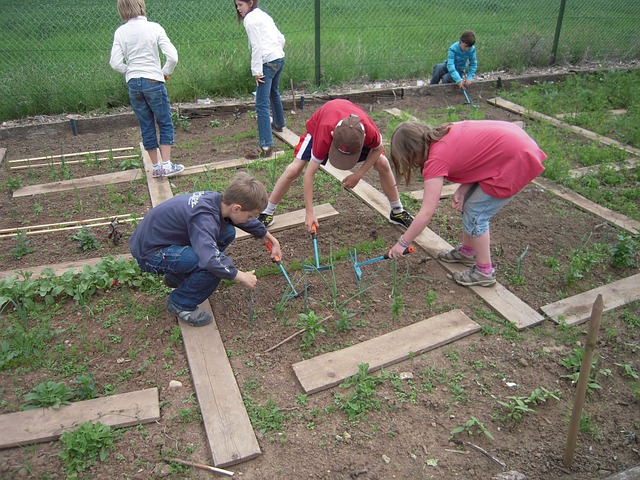Introduction – School Gardens
One avenue to sustainable food is garden farms and a way to get that concept across is hands-on experience with students at school through school gardens. School gardens benefit students, educators, and the larger community. For students, participating in a school garden offers hands-on education in science, nutrition, and sustainability. School gardens also serve as outdoor classroom spaces where students can connect with nature and gain skills in gardening and agriculture. I will discuss more school garden benefits in the next section.

School gardens can make lasting differences in students’ lives and help shape the next generation of environmental stewards. Many schools across the country have already implemented or plan to implement school gardens. Schools in low-income neighborhoods have historically had less access to fresh produce than other communities. As a result, children from these communities tend to suffer from higher rates of obesity and associated health conditions such as diabetes and heart disease. School gardens can address this issue by providing healthy food options for students and teaching them about the importance of nutrition.
10 School Garden Benefits
School gardening is a wonderful activity for students. There are many benefits to having a school garden, and here are 10 benefits of starting one in your school.
1. Get excited about science – Teaching children about plants and growing their food is a great way to get them excited about science. Gardening provides students with hands-on learning opportunities that can help them engagingly understand scientific concepts. For example, kids can learn about photosynthesis by watching new leaves sprout on the plants they have planted themselves!
2. Foster creativity – Research indicates that students who frequently visit school gardens are more imaginative and creative. This helps them excel in various subjects, such as science, math, language arts, etc. A school garden can also expose students to new ideas and experiences, which helps them grow as learners and thinkers.
3. Create a environment for exploration – School gardens provide a safe and healthy environment where children can play, explore, and learn. What’s more, they can help reduce stress by providing a calming space away from the classroom’s hustle and bustle of life.
4. Educate about food choices – Gardening helps kids become more mindful of their food choices and teaches them to appreciate nature. It also encourages them to eat more fruits and vegetables, which is an important part of staying healthy!
5. Develop self-esteem – School gardens are great for developing self-esteem in students and fostering a sense of community among all levels of students involved in the project – from preschoolers up to high school seniors. Individuals with diminished confidence often feel like valued contributors in a school garden, which can help boost their sense of self-worth.
6. Increase opportunities for outdoor exercise – Gardening provides opportunities for students to get outside and exercise – something that is invaluable in this era of screen time and indoor activities! Getting kids up, moving around, and playing outside helps them stay fit and healthy but also helps them learn how to interact with others positively.
7. Increase engagement with nature – School gardens provide the perfect opportunity for students to engage with nature daily. Many studies have shown that increasing contact with nature has many physical benefits, such as aiding in relaxation, lowering stress levels, reducing inflammation, improving concentration, and boosting creativity. Additionally, gardening is a wonderful out-of-school activity that can be fun and educational for kids.

8. Teach students ownership – Research has shown that school gardens can help students feel more connected to their school and community by giving them a sense of ownership in the building and grounds. Students who participate in gardening projects often take pride in maintaining the garden, which becomes an extension of themselves as they learn how to plant, grow, and harvest food with their hands. This encourages them to value and protect their surroundings, helping to create a safer environment where everyone feels welcome.
9. Develop skills in team work and communication – School gardens are great places for students to develop lifelong skills like teamwork, communication, problem-solving, leadership, independence, perseverance, and time management – all qualities that will be useful throughout their lives! Gardening also helps teach kids persistence and patience, which are essential when dealing with plants that may take time to grow.
10. Learn about the value of the environment – Last but certainly not least, school gardens provide children with an opportunity to connect deeply with the environment and learn about where their food comes from! This can help students feel more connected to the natural world and foster a love for protecting it for future generations. No matter what age or grade level your students are at, there is no doubt that starting a garden in your school will be beneficial for everyone involved!
What To Do When You Don’t Have Space For Gardening In Your School?
Luckily there are plenty of other ways to help your students reap the benefits of gardening, such as:
1. Bringing Plants Into The Classroom
Many types of plants can be grown indoors in a small pot or planter. This allows students to enjoy all the wonderful benefits of having a garden at their fingertips!
2. Gardening With Kids Online
There are many great resources for teaching children about gardening, including instructional videos and online course materials that you can access from home or school!
3. Hosting Interactive Activities And Events In The Garden
Whether it’s reading books outdoors, participating in student-led projects like creating seed starters, or learning how to compost food waste, there are countless ways to engage your students in gardening and the outdoors.
4. Creating A Community Garden Outside Of The School
If you are lucky enough to have an open space in your community, why not start a garden with other residents? This can be a wonderful bonding experience for everyone involved and encourage children to connect with their neighbors and develop lasting friendships!
Wrapping Up
There are many benefits to having a school garden, including providing opportunities for teamwork and collaboration among students, helping kids become more mindful about their food choices and eating habits, encouraging exercise, and fostering a sense of community throughout the school. Whether you are wondering how to start a school garden or simply hoping to improve an existing one, there are many great ways to incorporate gardening projects at your school. By getting kids up, moving around, and playing outside and helping them develop important life skills like persistence and patience, school gardens can be both fun and educational for students of all ages!
